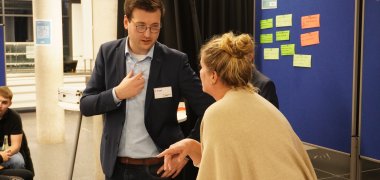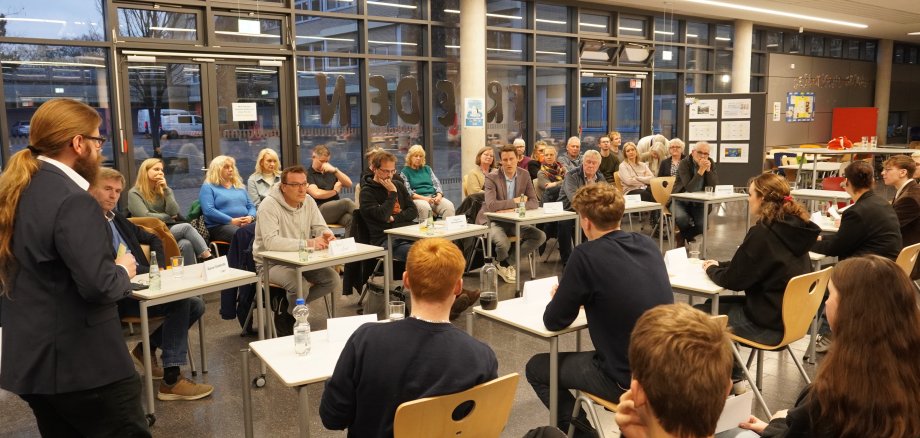The politicians were represented by the mayor Mr. Doetkotte, Mr. Speer, Mr. Borczyskowski and Mr. Greitenevert as members of the school committee.
Mr. Geukes, deputy principal of the Werner von Siemens Gymnasium and Mr. Schreurs, retired deputy principal of the Gronau comprehensive school, also took part in the discussion.
Students from years Q1 and Q2, Lenja Köster (Q1), Oberrecht, Bennet (Q2), Markus Tibben (Q2), Rieka Woelk (Q2), Kolja Kottig (Q1), Timo Beckmann (Q2), Lara Bracht (Q2) and Tyler Schlief (Q1) also took part in the discussion.
The discussion was moderated by Mr. Engel and Mr. Tillmann, two colleagues from the school.
The discussion focused on four questions:
Does a comprehensive school promote equal opportunities by supporting pupils regardless of their background?

This question was answered in the affirmative by the participants, whereby it was emphasized that comprehensive schools and other types of schools cannot replace the educational duties of parents. Good cooperation with parents is desirable so that both school and home accept and exercise their responsibility.
Mr. Doetkotte emphasized that open all-day schools create educational opportunities that can compensate for social inequalities. Pupil Rieka Wölk said that the Gronau comprehensive school was pursuing and implementing a path towards equal opportunities.
What are the advantages and disadvantages of comprehensive schools compared to other types of schools, such as grammar schools or secondary schools?
Pupils at the comprehensive school see that the school creates additional educational opportunities that go beyond the actual "must", such as the lunchtime forum, which provides advice on learning difficulties in the upper school, or the good contact with teachers who accompany the young people's careers. Kolja Kottig said that inclusive and differentiated work can help educational qualifications to develop "upwards".
What significance does the comprehensive school have for the region's educational landscape?
The participants in the discussion agreed that the comprehensive school offers educational opportunities for all children and distances itself from the pigeonholing of children from special needs children to grammar school pupils, as it trusts in the development of children, which is far from complete at the end of primary school.
What role will the comprehensive school play in the future of school policy and the world of work?
School policy will have to face major challenges in the coming years and guarantee the city's parents a wide range of educational opportunities for their children through the choice of secondary school. The world of work that our children will have to face is changing rapidly. Gronau Comprehensive School offers young people a wide range of internships and vocational preparation programs to prepare them for their future careers after graduation. The pupils agreed that they are well prepared for the time after school.
In conclusion, all participants agreed that this form of exchange should take place much more often and wished to be able to repeat such a discussion.
